Using essential oils from Citrus paradisi, or grapefruit, can serve as an effective fumigant against Solenopsis invicta, the red imported fire ant. Research shows that these oils greatly increase mortality rates among workers while altering their behavior, such as reducing foraging frequency and aggression levels. This natural alternative offers a promising solution to traditional chemical pest control methods, impacting not only the ants’ behavior but potentially ensuring more secure ecological practices. Discover more about its implications.
Key Insights
- Grapefruit essential oil (Citrus Paradisi) shows high mortality rates in Solenopsis invicta, with up to 90% mortality at 15% concentration within 5 minutes.
- Exposure to grapefruit oil alters fire ant foraging behavior, reducing frequency and leading to erratic foraging patterns.
- Aggression levels among fire ant workers significantly decrease after exposure to grapefruit oil, indicating disruption in their social structure.
- Essential oils can influence nesting behavior, resulting in reduced construction activity and increased abandonment of nests by fire ant workers.
- Grapefruit oil presents a natural alternative to synthetic insecticides, promoting safer pest management without fostering resistance in fire ant populations.
Overview of Solenopsis Invicta and Its Impact
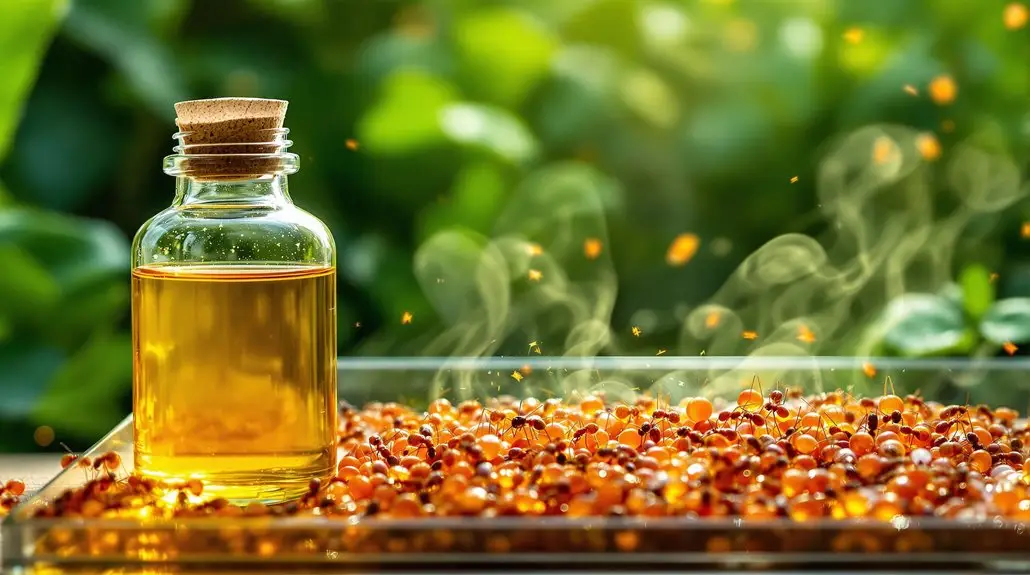
Although Solenopsis invicta, commonly known as the red imported fire ant, has gained notoriety for its aggressive behavior and painful stings, its impact extends far beyond individual encounters with humans.
These ants, originally native to South America, have established extensive colonies across the southern United States, causing significant ecological disruption. Their aggressive foraging and nesting behaviors threaten local wildlife, as they often outcompete native species for resources.
Additionally, their presence can cause economic damage, particularly in agricultural sectors where they disrupt farming practices. The stinging behavior of these ants poses health risks, particularly to vulnerable populations, including children and those with allergies.
Understanding the ecological and economic consequences of Solenopsis invicta is essential for developing effective management strategies. Researchers are currently exploring various methods, including biological control and natural repellents, to mitigate their impact on both the environment and human health, promoting a more balanced coexistence with these invasive pests. Furthermore, the use of natural repellents is being investigated as a potential eco-friendly solution for managing fire ant populations.
The Role of Essential Oils in Pest Management
Essential oils, derived from various plants, have gained recognition in pest management due to their natural properties and potential effectiveness against a range of pests, including invasive species like the red imported fire ant. These oils serve not only as alternatives to chemical pesticides but also promote environmentally friendly practices within pest control.
Here’s a quick summary of the role essential oils play:
| Aspect | Description |
|---|---|
| Natural Repellents | Many essential oils repel insects effectively. |
| Behavior Modification | They can alter pest behavior, disrupting feeding and nesting. |
| Eco-Friendly | Essential oils reduce chemical residues in the environment. |
Additionally, the efficacy of essential oils can be enhanced by employing Integrated Pest Management (IPM) techniques that focus on sustainable pest control methods.
Introduction to Citrus Paradisi and Its Properties
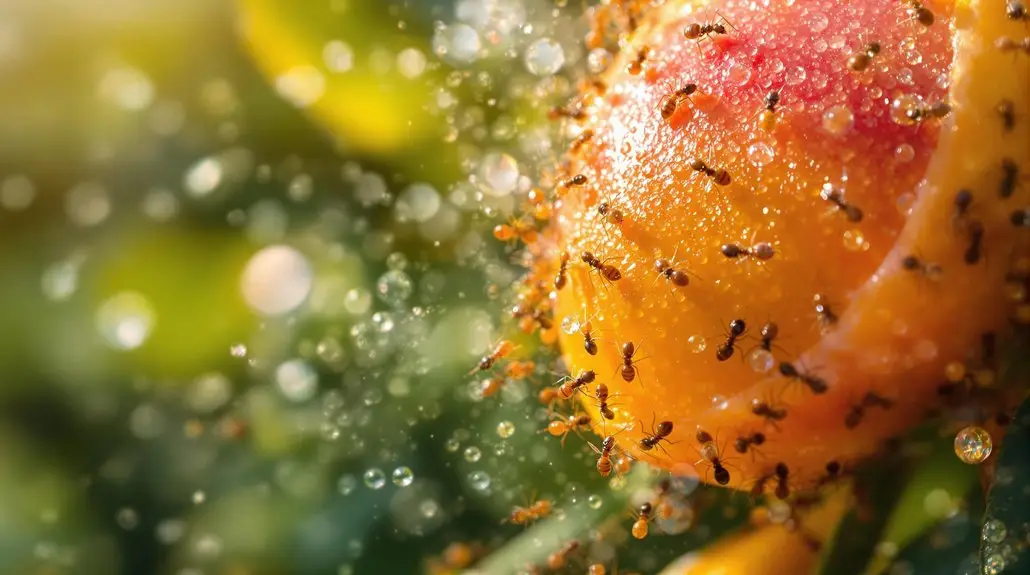
Citrus paradisi, commonly known as grapefruit, is a subtropical fruit that belongs to the Rutaceae family, recognized for its unique flavor and nutritional benefits. This fruit is rich in vitamins, particularly vitamin C, and contains numerous antioxidants, which contribute to its health-promoting properties.
Grapefruit’s essential oil, derived from its peel, possesses a revitalizing aroma and a complex chemical composition, including compounds like limonene and myrcene. These compounds not only enhance the oil’s scent but also offer potential applications in pest management.
In addition to its aromatic qualities, grapefruit essential oil demonstrates antimicrobial properties, making it a valuable candidate for further research. As you explore the uses of grapefruit oil, consider how its natural components can influence both pest behavior and the environment. Moreover, its application aligns with organic pest control practices, which emphasize sustainability and minimize chemical pesticide use.
Understanding these properties of Citrus paradisi can foster a deeper appreciation for its role in natural pest control methods.
Extraction Methods for Grapefruit Essential Oils
When extracting essential oils from grapefruit, it’s important to understand the various methods available, as each technique can yield different qualities of oil.
You might encounter cold press extraction, which efficiently captures the oil from the peels, or steam distillation, a process that involves passing steam through the plant material to separate the oil.
Additionally, solvent extraction techniques can provide a more concentrated product, but they often involve the use of chemical solvents that require careful consideration.
Cold Press Extraction
The process of cold press extraction serves as a primary method for obtaining grapefruit essential oils, leveraging pressure to release the aromatic compounds from the fruit’s peels without the application of heat. This technique guarantees that the essential oils retain their natural qualities and potency, making them ideal for various applications, including fumigation.
| Aspect | Description |
|---|---|
| Method | Uses mechanical pressure |
| Benefits | Preserves flavor and aroma |
| Applications | Aromatherapy, cleaning products |
Steam Distillation Process
Steam distillation stands out as a widely recognized method for extracting essential oils from grapefruit, employing heat and steam to facilitate the release of volatile compounds from the fruit’s zest.
In this process, steam passes through the plant material, causing the essential oils to vaporize. The vapor then travels through a cooling system, where it condenses back into a liquid form, separating the essential oil from water.
This method not only preserves the delicate aromatic properties of grapefruit, but it also guarantees a high yield of oil, making it efficient for commercial production.
Solvent Extraction Techniques
While steam distillation remains a popular method for producing grapefruit essential oils, solvent extraction techniques offer an alternative that can yield different profiles of the oil, capturing the full range of aromatic compounds without the heat involved in distillation.
In this method, solvents such as ethanol or hexane dissolve the essential oils from the grapefruit peel, allowing the extraction of volatile and non-volatile compounds.
Afterward, the solvent evaporates, leaving behind a concentrated oil known as an absolute, which often possesses a richer aroma.
This technique not only preserves delicate compounds that might be destroyed by heat but also enhances the overall scent profile, making it a valuable option for those seeking vibrant and complex grapefruit essential oils in their applications.
Efficacy of Grapefruit Essential Oils Against Fire Ants
| Concentration (%) | Mortality Rate (%) | Time to Effect (min) |
|---|---|---|
| 5 | 30 | 15 |
| 10 | 60 | 10 |
| 15 | 90 | 5 |
These results indicate a clear relationship between the concentration of grapefruit essential oils and their effectiveness, suggesting that higher concentrations yield quicker and more lethal impacts on fire ant populations. This research opens doors for further exploration into natural pest control methods, highlighting the potential for eco-friendly solutions in pest management.
Behavioral Changes in Fire Ant Workers Exposed to Essential Oils
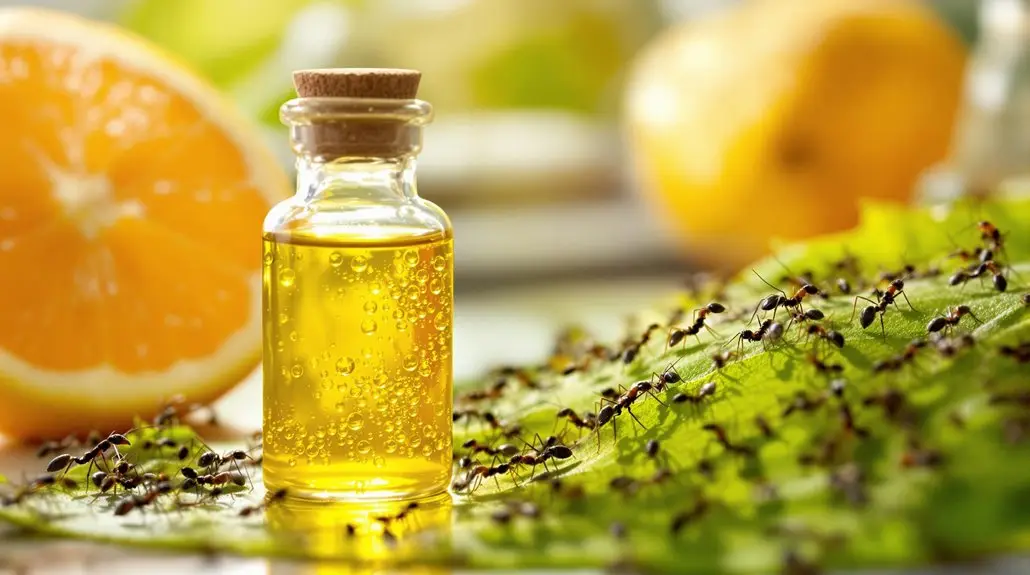
When fire ant workers are exposed to essential oils, researchers observe significant behavioral changes that can impact their colony dynamics.
For instance, you may notice altered foraging patterns, as these ants often exhibit reduced activity when seeking food, which can affect their survival.
Additionally, variations in aggression levels and changes in nesting behavior can further disrupt the social structure of the colony, highlighting the potential implications of using essential oils as a fumigant.
Altered Foraging Patterns
Researchers have observed that exposure to essential oils, particularly those derived from Citrus Paradisi, can greatly alter the foraging patterns of fire ant workers.
These changes can profoundly impact their behavior and overall colony dynamics. You might notice several key effects:
- Reduced Foraging Frequency: Workers may venture out less often to search for food.
- Altered Routes: The paths they take during foraging can become erratic or less direct.
- Increased Recruitment Time: It may take longer for workers to gather and recruit others for food sources.
- Shift in Food Preferences: Their choices regarding food can change, leading them to prefer different items altogether.
These findings suggest that essential oils can influence fire ant behavior in ways that could affect their survival and efficiency as a colony.
Aggression Levels Variation
While exploring the effects of essential oils on fire ants, researchers have found that exposure to Citrus Paradisi greatly alters aggression levels among worker ants. These changes can considerably impact their social structure and interactions. As you investigate this fascinating study, consider how essential oils can influence not just individual behavior but also the collective dynamics within the colony. The following table summarizes the observed aggression levels in response to exposure:
| Exposure Duration | Aggression Level (1-10) |
|---|---|
| No Exposure | 5 |
| 30 Minutes | 3 |
| 60 Minutes | 1 |
Nesting Behavior Changes
As exposure to essential oils like Citrus Paradisi alters aggression levels in fire ants, it also leads to notable changes in their nesting behavior, prompting a reevaluation of how these substances affect their overall colony dynamics.
The essential oils not only affect individual behavior but also influence how workers interact within their colony.
Here are some observed changes in nesting behavior:
- Reduced Nest Construction: Workers exhibit less activity in building and expanding nests.
- Altered Foraging Patterns: Fire ants spend more time foraging away from the nest.
- Increased Nest Abandonment: Some nests are left unguarded, leading to potential colony vulnerabilities.
- Disruption of Social Interactions: Communication between workers becomes erratic, impacting colony cohesion.
These behavioral shifts provide insights into the complex effects of essential oils on fire ant colonies.
Comparison With Conventional Pest Control Methods
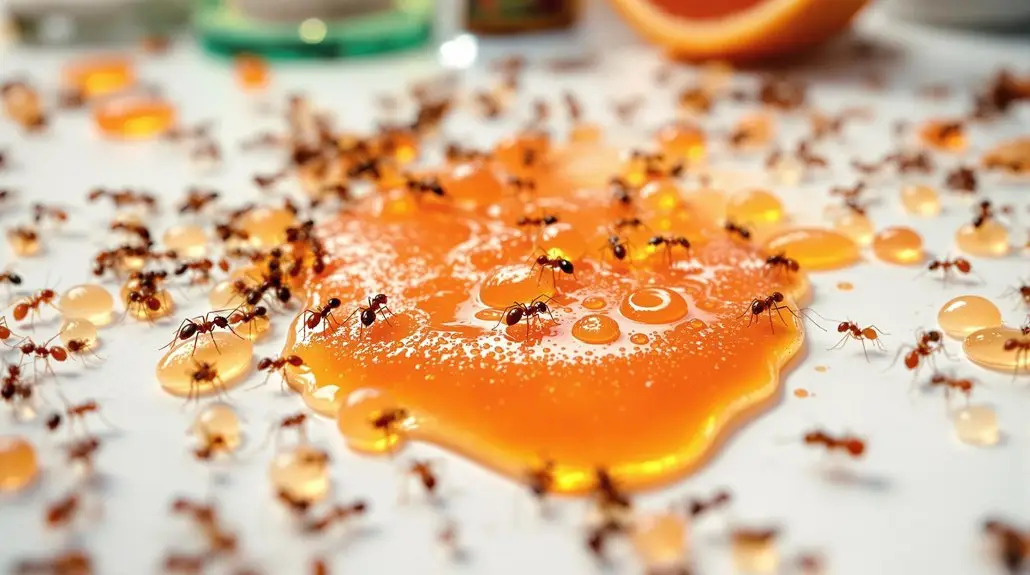
When considering the effectiveness of Citrus Paradisi, commonly known as grapefruit, as a fumigant, it’s essential to compare it with conventional pest control methods that often rely on synthetic chemicals.
Traditional approaches, such as insecticides, can be highly effective in exterminating pests like Solenopsis invicta workers, but they frequently pose risks to human health and environmental protection.
In contrast, grapefruit oil presents a more natural alternative, offering a potential solution that minimizes harmful side effects. While synthetic chemicals may yield immediate results, they often lead to resistance in pest populations over time.
Grapefruit oil, on the other hand, may disrupt pest behavior without fostering resistance, providing a sustainable option for pest management.
Additionally, using essential oils can cultivate a sense of community engagement, as individuals increasingly seek eco-friendly practices that support both their health and the environment.
Moreover, research shows the effectiveness of essential oils in pest prevention, highlighting grapefruit oil as a promising alternative to conventional methods.
Consequently, grapefruit oil emerges as a promising alternative to conventional methods.
Environmental Considerations of Using Essential Oils
Environmental considerations play an essential role in determining the viability of using essential oils, such as grapefruit oil, in pest management strategies.
When evaluating these oils, it’s important to reflect on their impact on ecosystems and human health, ensuring that we choose sustainable options. Here are some key factors to contemplate:
- Non-target Species: Essential oils may affect beneficial insects and other wildlife, disrupting local ecosystems.
- Bioaccumulation: Some compounds in essential oils can accumulate in the food chain, potentially harming larger animals, including humans.
- Air Quality: The volatility of essential oils can influence air quality, affecting respiratory health for those nearby.
- Sustainability: The sourcing of essential oils should prioritize sustainable practices to avoid depleting natural resources. Additionally, the use of Bacillus thuringiensis as a larvicide in integrated pest management can help minimize the ecological impact of mosquito control methods.
Future Directions for Research and Application
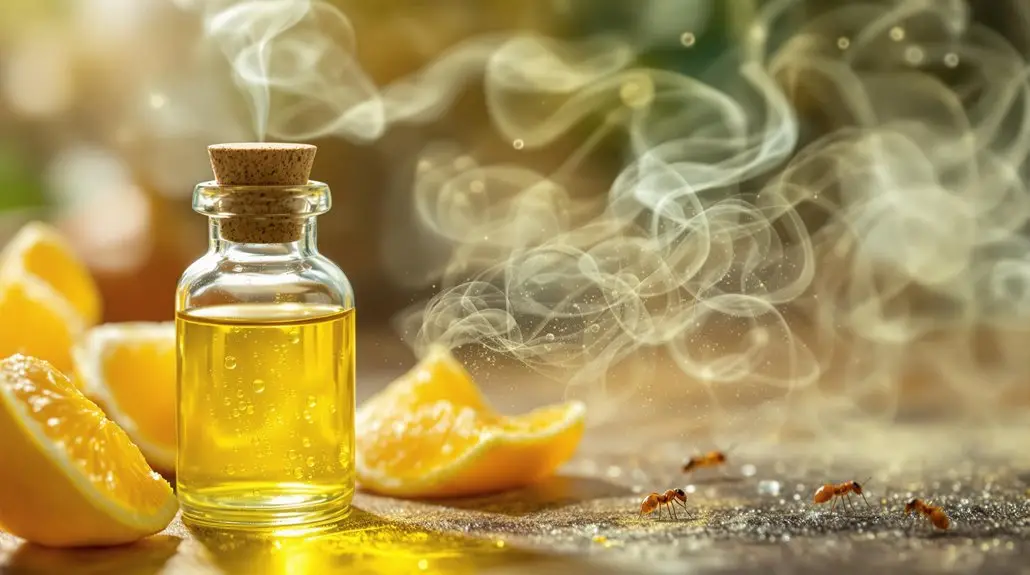
Research into the application of Citrus Paradisi, commonly known as grapefruit, as a fumigant has opened various avenues for future exploration, particularly in enhancing pest management strategies.
As researchers continue to study the efficacy of grapefruit essential oils against Solenopsis invicta, or fire ants, there’s potential for developing more sustainable and eco-friendly pest control methods.
Future studies could investigate the ideal concentrations of these oils, their long-term effects on ant populations, and the impact on non-target species, ensuring a balance in ecosystem health.
Additionally, exploring the combination of grapefruit oil with other natural substances might yield synergistic effects, further improving pest management efficacy.
Engaging with local communities on these findings can foster greater awareness and acceptance of natural pest control solutions.
Frequently Asked Questions
How Safe Are Grapefruit Essential Oils for Pets and Children?
Grapefruit essential oils can pose potential risks for pets and children, primarily due to their concentrated compounds.
When exposed, pets may experience gastrointestinal distress or skin irritation, while children might face similar reactions.
It’s crucial to ascertain proper dilution and usage, keeping these oils out of reach.
Always consult a healthcare professional before introducing any essential oils into your home, as protective measures vary based on individual sensitivities and health conditions.
Can Grapefruit Essential Oil Be Used Indoors Without Causing Harm?
Research indicates that 70% of essential oils can be securely used indoors when properly diluted, making grapefruit essential oil a viable option for many households.
However, it’s vital to guarantee adequate ventilation and monitor for any adverse reactions, particularly in pets or young children.
What Are Alternative Uses for Grapefruit Essential Oil Beyond Pest Control?
Grapefruit essential oil offers various alternative uses beyond pest control. You can incorporate it into aromatherapy to promote relaxation and alleviate stress, as its uplifting scent may enhance mood.
Additionally, it’s often used in skincare products for its potential antibacterial properties, helping to cleanse and rejuvenate the skin.
Furthermore, you might find it beneficial in natural cleaning solutions, where its antimicrobial qualities can effectively disinfect surfaces while leaving a fresh aroma.
How Long Do the Effects of Grapefruit Essential Oil Last on Fire Ants?
When you consider the lingering effects of grapefruit essential oil on fire ants, it’s like a fleeting shadow—brief yet impactful.
Research indicates that the effects can last anywhere from a few hours to several days, depending on environmental factors such as temperature and humidity.
Researchers found that higher concentrations tend to prolong the impact, ultimately influencing ant behavior during this timeframe.
Therefore, understanding these variables proves essential for effective pest management strategies.
Are There Any Known Allergies Associated With Grapefruit Essential Oil?
Yes, grapefruit essential oil can trigger allergic reactions in some individuals.
These reactions may include skin irritation, rashes, or respiratory issues, particularly in people with sensitivities to citrus or other essential oils.
It’s important to conduct a patch test before using the oil extensively.
Additionally, if you experience any adverse symptoms, you should discontinue use immediately and consult a healthcare professional for appropriate guidance and care regarding your specific situation and health.
Final Thoughts
Embracing Natural Solutions for Pest Control
Ultimately, utilizing essential oils from Citrus paradisi as a fumigant against Solenopsis invicta workers symbolizes a shift toward more sustainable pest management practices. By demonstrating the efficacy of these natural compounds, researchers pave the way for innovative solutions that respect ecological balance while addressing pest issues. As we explore these avenues further, it is vital to contemplate both the behavioral impacts on fire ants and the potential benefits of integrating natural alternatives into pest control strategies.
A New Dawn in Pest Control: Harnessing Nature’s Power
At NaturePest Holistic Pest Control in South Florida, we invite you to join us in embracing these groundbreaking methods. By opting for natural pest management solutions, you not only protect your environment but also contribute to the preservation of local ecosystems. Explore the potential of essential oils and become a part of the movement towards sustainable pest control today!

